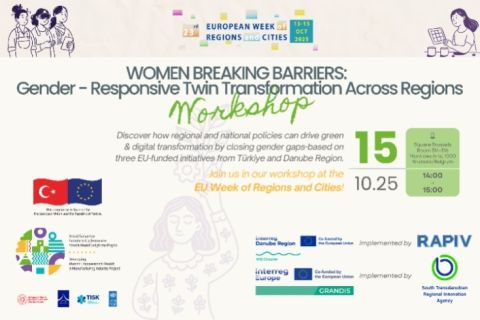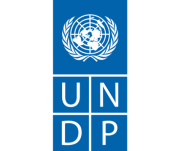
This session brings together three EU-funded initiatives that promote women's leadership in the twin transformation. While the WE.Circular project focuses on fostering policy ecosystems for women entrepreneurs across the Danube Region, the GRANDIS project concentrates on European policy solutions related to the twin transition of female-driven SMEs, and the Developing Women Empowerment Models in Manufacturing Industry project aims to strengthen women’s participation in manufacturing and STEM through gender-responsive transformation models. The session highlights replicable models, cross-sectoral policy dialogue and stakeholder collaboration for women’s empowerment in regional development.
- Cohesion | Digital and ICT | Governance and Public administration | Industry, entrepreneurship and SMEs (enterprise/ startup/ business) | Jobs and Employment | Local and regional | National | Neighbours (ENI + IPA + EFTA + UK) | Research and Innovation | Social inclusion and Equality | Sustainable
- Code: 15WS252127
- Square Brussels, 314-316
Speakers
Moderator
Practical information
- When
-
Wed 15/10/2025, 14:00 - 15:00 CET
- Where
- Square Brussels, 314-316
- Type of partnership
- Partnership
- Format
- Workshop
- Theme
-
Cohesion and Growth for the Future
- Language
- English

Partners

United Nations Development Programme

Turkish Conferedation of Employer Associations

MEXT Technology Center (MEXT)
Reporting
Session summary
The workshop “Women Breaking Barriers: Gender-Responsive Twin Transformation Across Regions” highlighted how regional cooperation, innovation, and policy dialogue can accelerate the green and digital transition while promoting women’s leadership and empowerment in manufacturing and entrepreneurship.
1. Women at the Center of the Twin Transition
Speakers underlined that equality is not only a social priority but a key driver of sustainable industrial transformation. Women's empowerment in green and digital sectors unlocks untapped potential, enhances competitiveness, and contributes directly to inclusive growth, as well as the EU’s Green Deal and Digital Strategy goals.
2. Multi-Stakeholder Collaboration as a Catalyst
Across all three initiatives, success depended on partnerships among public institutions, private-sector actors, academia, and civil society. Building such alliances fosters innovation, ensures sustainability, and bridges the gap between policy design and implementation on the ground.
3. Capacity Development and Skills for the Future
Speakers presented the significant activities in their projects to support women with the technical, digital, and leadership skills required for the future of work:
-In Türkiye, over 300 women from STEM fields, namely change agents and operators, were trained in digital and green transformation, with more than 200 integrated into the manufacturing workforce through the Developing Women Empowerment Models in Manufacturing Industry project.
-The WE.Circular project introduced training programs on circular business models and identified critical policy and implementation gaps that hinder women entrepreneurs in the Danube region.
-The GRANDIS project developed cross-regional exchanges and good practices to improve regional policy instruments and strengthen gender-sensitive SME ecosystems.
4. Lessons for Policy Development and Sustainable Models
The discussions emphasized the importance of the topics summarized below:
-Integrating equality-responsive approaches into industrial, digitalization, and circular economy policies;
-Designing scalable and replicable models that can be adapted across EU regions;
-Ensuring continued mentorship, financing, and networking support for women-led enterprises and change agents.
5. Next Steps
Speakers and the moderator called for stronger regional cooperation to transform lessons into actionable policy frameworks. The session concluded that women's empowerment to lead in green and digital sectors is essential for achieving a just, inclusive, and sustainable twin transition across Europe.
Quotes
-
Policymakers are encouraged to advance women’s green and digital transitions by integrating gender perspectives into relevant policies, enhancing support and cooperation mechanisms, and promoting inclusive training in digital and circular skills.
At STRIA, we believe collaboration drives impact. Through the GRANDIS project, sharing good practices and connecting across regions, we empower women to lead the green and digital transition and build bridges between entrepreneurs and policymakers.
An inclusive twin transformation in the manufacturing industry requires engaging all actors involved. Building scalable, replicable models to guide future actions is equally vital for ensuring lasting and sustainable impact.




